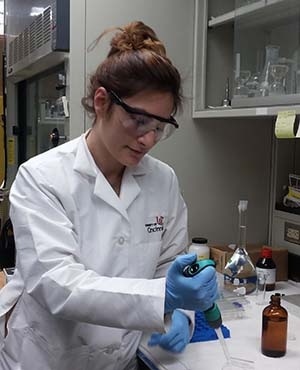Jan 8 2018
The National Science Foundation has awarded an interdisciplinary team of University of Cincinnati researchers a grant of $359,951 to produce sensors in order to assess a key environmental problem in monitoring toxins in fresh water.
 Vasileia Vogiazi, student research assistant, working in Dr. Dionysiou's lab. (Image credit: University of Cincinnati)
Vasileia Vogiazi, student research assistant, working in Dr. Dionysiou's lab. (Image credit: University of Cincinnati)
This grant will enable researchers to come up with better ways of detecting deadly bacteria present in drinking water sources.
The grant has been funded by the CBET Division of Chemical Bioengineering Environmental and Transport Systems of NSF. The aim here is to develop fast-responding and greatly-selective sensors for the detection and also quantification of toxins in drinking water also including its sources.
The existence of high concentrations of cyanotoxins in a number of freshwater lakes and streams, some of which function as sources of drinking water, critically threatens environmental and human health. In 2014, for instance, the cyanobacterial harmful algal bloom in Lake Erie was responsible for affecting drinking water for more than 500,000 people in Toledo, Ohio, according to a latest congressional report.
The project, entitled “Nanosensor for the Point-of-Use Detection of Hepatotoxic Microcystins in Water,” will particularly develop and test an exclusive sensor designed for detecting and quantifying algal toxins frequently detected in fresh water.
This research focuses on addressing the urgent requirement for speedy on-site monitoring and the quantification of microcystins in surface waters going through algal blooms. Microcystins are considered to be a group of frequently detected cyanotoxins present in fresh water experiencing issues related to algae blooms.
We are honored to receive support from NSF. The award will allow us to continue our research activities and directly advance the knowledge and understanding while also promoting teaching, training and learning at UC. Through this research effort, we look forward to creating vital solutions in the realm of water quality and we hope to get closer to presenting a point-of-care sensor for environmental applications to UC and the scientific community.
Dionysios Dionysiou, Leader and Principal Investigator
Dionysiou, a PhD and a professor in the Department of Chemical and Environmental Engineering in UC's College of Engineering and Applied Science (CEAS), is a specialist in water quality research. He has analyzed topics such as contaminants of emerging concern, the remediation of harmful algal blooms, water sustainability and environmental nanotechnology, among others.
“When focusing on big ideas, interdisciplinary teamwork is the key in advances of critical thinking and problem solving,” Dionysiou said.
Co-principal investigator William Heineman, another leader on the project, is a well-known expert and research professor in bioanalytical and electroanalytical chemistry in UC's McMicken College of Arts and Sciences. Heineman concentrates on the development of the electrochemical biosensor aspects of the project.
Vesselin Shanov, CEAS professor of chemical and materials engineering and director of UC's Nanoworld Lab, also works as co-principal investigator. He is an expert in the application and synthesis of carbon nano-structured materials such as graphene and carbon nanotubes. In this project, Shanov's efforts will concentrate on using nano-structured carbon as an active electrode of the developed sensor.
The University of Illinois at Chicago's Ian Papautsky is a partner on this project, focusing on the investigation of microfluidic systems.
The project focuses on developing nano-structured biosensors for selective identification and quantification of toxins present in water. Two outcomes are targeted: to certify sensor performance with real-world water samples and to show nano-structured sensors for point-of-use determination of toxic compounds. The fabricated device will be examined for its potential to identify and then quantify toxins present in lakes or streams that can harbor cyanobacteria.
“This study will also provide a fundamental understanding of the principles for creating nano-biosensors used in selective identification and quantification of a wide range of organic and inorganic toxic compounds in natural water environments,” Dionysiou said.
The researchers expect to offer a major contribution to the field of nano-biosensing in order to monitor water quality. The nanotechnology-based biosensors launched in this research can be produced for in-situ monitoring of contaminants in water and will have great implications for managing sources of drinking water and also protecting human health. Furthermore, these efforts could establish to be complementary to constant efforts for restoring and sustaining waterways.
“This NSF award will benefit students from underrepresented groups, while growing productive academic community partnerships,” Dionysiou said. “Bringing together a research team of graduate students, undergraduate students, postdoctoral fellows and faculty will directly advance the knowledge and understanding while promoting teaching, training and learning.”
Vasileia Vogiazi, a student research assistant working on this project for her doctoral studies is in agreement.
“Innovative and interdisciplinary approaches will be key in dealing with tomorrow’s scientific challenges. This is a great opportunity for me to develop the skills to meet those challenges,” Vogiazi said.